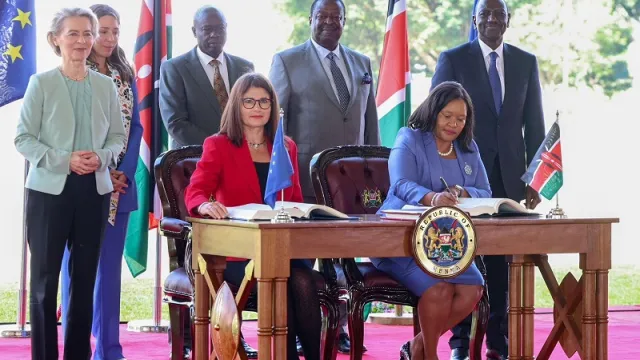Kenya-EU trade deal takes a leap forward

Kenya-EU trade deal takes a leap forward
The endorsement by the European Parliament of an economic partnership agreement with Kenya marks a huge milestone in the relationship between the European Union (EU) and Kenya.
This agreement is poised to facilitate long-term tax-free access for Kenyan exports to the 27 countries in the EU bloc, including flowers, tea, coffee, fish, vegetables, fruits, nuts, and more.
This provision not only guarantees stability and predictability for farmers, processors, and traders in Kenya but also strengthens the country's position in the global market by ensuring continued access to EU markets. Progressively, the agreement will see opening up of the Kenyan market for duty-free imports and investments from Europe.
Furthermore, the EPA opens up significant opportunities for the EU in trade and investment within Kenya. The agreement is expected to spur job creation in manufacturing sectors such as chemicals, steel, pharmaceuticals, machinery, and related industries.
This influx of European investment will not only boost Kenya's economy but also position the country as a strategic hub for European investors looking to access the wider East African Community (EAC), Common Market for Eastern and Southern Africa (COMESA), and the African Continental Free Trade Area (AfCFTA).
Despite the European Parliament's endorsement, the agreement's final approval and ratification requires that the heads of state and government in the EU give their consent. Simultaneously, Kenyan lawmakers are expected to debate and approve the document for it to become legally enforceable.
The agreement extends beyond the realm of trade, as it reflects the EU's new approach to trade and sustainable development, particularly with developing countries.
This is highlighted by the agreement's inclusion of binding and enforceable provisions on international standards, labour, gender equality, climate, and the environment.
Read also: Kenya’s Eurobond issuance sparks economic optimism
Labour and environmental standards
Notably, the agreement prevents both parties from lowering labour and environmental standards, ensuring a level playing field for trade and investment.
The EU-Kenya Economic Partnership Agreement (EPA) was endorsed by 366 EU lawmakers, with 86 members rejecting it and 56 abstentions.
If enacted, the agreement will safeguard Kenya's largely farm produce exports, ensuring their continued access to EU markets duty- and quota-free.
However, Kenya will be required to gradually lower duties on imports from Europe over 25 years, leading to a liberalized trade regime between the two parties.
This means that goods from Europe will be exempt from duties, while investments from the EU will also receive incentives, further enhancing bilateral trade relations.
Moreover, the EPA includes a crucial clause aimed at protecting Kenya's agriculture and food security against unfair competition from the EU.
This protectionist clause prohibits the EU from applying blanket subsidies, ensuring that Kenyan farmers can compete fairly in the European market.



